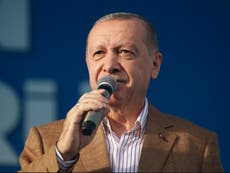France unveils controversial proposed law on Islamist extremism
Prime minister insists proposed law is not ‘against religions nor Muslim faith in particular’

Your support helps us to tell the story
From reproductive rights to climate change to Big Tech, The Independent is on the ground when the story is developing. Whether it's investigating the financials of Elon Musk's pro-Trump PAC or producing our latest documentary, 'The A Word', which shines a light on the American women fighting for reproductive rights, we know how important it is to parse out the facts from the messaging.
At such a critical moment in US history, we need reporters on the ground. Your donation allows us to keep sending journalists to speak to both sides of the story.
The Independent is trusted by Americans across the entire political spectrum. And unlike many other quality news outlets, we choose not to lock Americans out of our reporting and analysis with paywalls. We believe quality journalism should be available to everyone, paid for by those who can afford it.
Your support makes all the difference.A controversial draft bill aimed at reinforcing secular values and fighting radical Islamism has been unveiled in France.
The proposed legislation was put before ministers on Wednesday, before details of it were outlined, including greater restrictions on homeschooling.
On the same day, the prime minister defended the proposals, which have sparked controversy in some circles, in a newspaper interview.
“We are facing an enemy that attacks our values, that even attacks out citiens through terrorist acts,” Jean Castex told Le Monde said, evoking the beheading of Samuel Paty and an attack on a Nice church that killed three people last month.
“We must strengthen ourselves to be better able to confront this.”
The draft law contains a host of measures aimed at tackling radicalism and protecting what the government has called “republican values”.
Ministers have insisted neither Islam as a religion nor regular Muslims are targeted by the draft law, which is made up of about 50 articles aimed at enabling better oversight of mosques, associations, public services and schools.
The aim, they say, is to reduce the space where radicals can operate and ensure that French values, including secularism, are guaranteed.
It contains strengthened checks on associations, including their activities and how they are using money granted to them, and encourages mosques to register as places of worship, so as to better identify them.
Foreign funding for mosques, while not forbidden, would have to be declared if more than 10,000 euros.
Another notable measure is making school obligatory from three years old, with the ability to opt out in favor of home schooling for special cases only. The text includes important measures to “ensure each child gets an education in keeping with the values of the Republic,” Mr Castex said in a press conference over the proposed law.
“The government wants to give itself the means to fight against those that distort religion to challenge the values of the Republic,” Gerald Daramnin, the interior minister, said in a tweet about the proposed bill.
Meanwhile, Mr Castex said the suggested law was not “a text against religions, nor against the Muslim faith in particular”. Instead, it was a “law of freedom in the face of religious fundamentalism”, he tweeted.
Parliament is expected to open what is likely to be a lively debate on the draft law in the months ahead. The measure, long in the making and refined until days before its presentation, has gone through various name changes and is now known by the delicate title "Supporting Republican Principles."
Asked by Le Monde why a focus seems to be on radical Islamism, but this is not touched upon in the law’s name, Mr Castex said: “It isn’t just that in the text.”
“But the enemy of the Republic is a political ideology called radical Islamism, which aims to cause divisions among the French population.”
It comes after the French president outlined plans to tackle what he called Islamist "separatism” at the start of October - weeks before Samuel Paty was beheaded after showing pupils caricatures of the Prophet Muhammad, and several people were killed in an attack on a Nice church.
Earlier this year, Mr Macron called Islam a religion “in crisis" over the world, and vowed to continue publishing Charlie Hebdo cartoons of the Prophet Muhammed.
His stance has drawn criticism from Muslim communities - even sparking protests.
On Wednesday, the Turkish president - who has criticised the French president’s attitude towards Islam in the past - slammed France as a country “where racist rhetoric, actions are intensified”, following an allegation of racism against a match official during a Champions League match between a French and Turkish team.
On Tuesday, Istanbul Basaksehir's players, closely followed by their opponents Paris St Germain, walked off the pitch during a Champions League soccer game on Tuesday after the Turkish club accused a Romanian match official of racism.
Additional reporting by agencies



Join our commenting forum
Join thought-provoking conversations, follow other Independent readers and see their replies
Comments